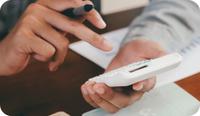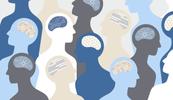The Social Media Self-Diagnosis Explosion

While I love a good therapy meme as much as the next person, I must admit I get a little nervous when one of my clients begins a session with, “So I saw this thing on TikTok . . . .” Recently, I’ve observed an increasing trend of clients coming into sessions with worries or concerns prompted by “informative” videos they’ve seen on social media. Given recent criticism of the negative impacts of social media on mental health, particularly in adolescents, is this wave of information also a potentially damaging phenomena?
It’s worth noting that this issue is really nothing new, so I’m not exactly trying to sound the alarm and turn social media into a scapegoat for all society’s problems.
I can recall my own exposure to trending pop psychology and layman’s terminology about various mental illnesses over the years, long before the advent of social media.
My high school, for example, could have benefitted from a mental illness swear jar—drop in $1 for every time you use the term “depressed” when you really mean disappointed, or label someone who likes organization and order as “so OCD.”
As a teen and young adult, who could resist the allure of a magazine personality or relationship quiz to definitively answer, “What kind of person am I?”
On a much broader scale, the self-help industry has been lucrative for over a century, growing from books to television to blogs and virtual seminars. While many might say they have found this type of content helpful, many also criticize the industry. Some have even likened a more extreme compulsion to constantly consume this type of material, or make personal improvements, to an addiction.
Counseling Clients Who Self-Diagnose
Still, while the self-diagnosis and self-labeling dynamic is nothing new, it has certainly been increasing in frequency, intensity, and speed due to the wide availability of information in this digital age. The algorithms on social media platforms are essentially computerized label-makers, designed to hone in on our interests—mainly in hopes of perfecting targeted consumerism.
Not only is any information on earth available with a quick internet search, but if you use social media, you can’t escape the bombardment from ads and suggested content, making it infinitely easier to find oneself going down a rabbit hole of supposed self-discovery. Combine these algorithms, the basic psychological need we have to understand ourselves, and a targeted group often in an age range where it’s developmentally appropriate to try on identities for size, and there we have it—a self-diagnostic explosion.
I’ve had several experiences in my practice recently that have crystalized this boom for me.
One client came in stating it’s clear now that they have ADHD (they don’t). Two weeks later, they began the session by stating, “I actually think I’m low-key autistic” (they’re not).
Another client tearfully asked if any part of her personality is genuine and untouched by her perpetrator, after watching videos—all made by people who seemed certain of what they were saying—talking about how behaviors she thought were benign are actually all trauma responses.
There have also been LGBTQIA+ clients exposed to black-and-white judgments from others, boldly speaking on behalf of the entire community, insisting on how people should be accurately labeling their gender or sexuality. These kinds of statements can lead to further confusion and feelings of alienation, especially when seen online with little context. Lastly, I’ve had several clients exposed to content from supposed experts on narcissism, and become mistakenly convinced that any disagreement with their point of view, or anything that causes them to feel guilt, is gaslighting.
Not only is this an issue of self-diagnosis, but it’s also one of contagion. In October 2021 an article came out regarding a number of adolescent girls who began demonstrating psychogenic tics after watching videos claiming to show what it’s like to have Tourette’s Syndrome.
Strangely, even the woman who wrote the article later stated she herself began to experience repetitive tic-like movements after watching a number of videos for her work.
The Other Side of Social Media and Mental Health
All of this isn’t to say social media is all bad, because it isn’t.
The internet has at times been helpful in giving often marginalized groups a place to relate to other like-minded individuals. It can provide an opportunity to gain information and support around things like sexuality, gender identity, chronic illness, neurodivergence, trauma, or mental illness. In some cases, seeing others talking about their own labels or difficulties on social media may even be a way for someone to find the courage to begin talking about their difficulties and seek help.
Recently, TikTok began presenting resources or crisis hotline numbers to those who search suicide or eating disorder-related topics. There are also some actual experts on the app dispelling misinformation and sharing coping strategies and other accurate information. Especially during the height of the pandemic, this proved invaluable to many, providing a way to cope with the isolation and anxiety of a collective trauma, particularly for those who don’t have access to mental healthcare.
I’ve certainly known people, both clients and friends, who encountered social media content that they found validating or informative, perhaps finally finding an answer to why they react a certain way.
Sadly, though, for every legitimate clinician trying to provide helpful info, there are dozens more users presenting themselves as experts, taking diagnostic criteria or labels out of context or to an extreme. All this can lead to the trends I mentioned in mistaken self-diagnosis, or toxic over-labeling. In these circumstances, normally unremarkable behavior can be deemed pathological, and those who harbor core beliefs that something is inherently wrong with them are especially susceptible.
As an autistic friend of mine pointed out, everyone has a different relationship to the internet and social media, and that will impact the way they use either in regards to their mental health. In his experience, he’s found it helpful to discover information that explains some aspects of his behavior since being diagnosed, and this has reduced some alienation or loneliness on his journey. He also has made it a point to seek a professional evaluation to obtain formal diagnosis after doing his own research, using social media to only provide support and understanding about something he knows for sure. After all, that’s what’s necessary to truly know if you meet criteria for something. Professional assessment for clinical significance of symptoms is key.
How to Help Clients Navigate Social Media
The use of social media to understand mental health has evolved, and is driven, by human nature and our basic desire to understand ourselves. While there are no one-size-fits-all answers about whether social media and its impact on mental health one way or another, checking in with our clients about how they’re using it is never a bad idea. Mental health, like body image, has become another facet of targeted marketing, and therefore potential insecurity.
The clients we see in our offices, or on our screens, are lucky in that they have us as a sounding board. We can hear their concerns and do what we do best: assess the situation, and then dispel misinformation and reassure knee-jerk concerns. Social media usage is one more area that we need to regularly assess and check in about, as it poses a risk to our clients’ health.
Those clinicians who maintain an ethical internet presence do us all a great service by counteracting misinformation, and guiding the public in the right direction. The social media landscape could really use more of that. Let’s all continue to demystify, encourage, and normalize seeking a professional opinion, and be careful to provide disclaimers to deter the public from relying solely on generalized information gleaned from any platform—including from us!
We can do our part to make sure accurate and easily-understandable information about clinicians’ licensure and modalities, or how to access mental healthcare, is readily available. If we do that, we can help our clients and the public make the most informed decisions about their healthcare.
How SimplePractice Streamlines Running Your Practice
SimplePractice is HIPAA-compliant practice management software with everything you need to run your practice built into the platform—from booking and scheduling to insurance and client billing.
If you’ve been considering switching to an EHR system, SimplePractice empowers you to run a fully paperless practice—so you get more time for the things that matter most to you.
Try SimplePractice free for 30 days. No credit card required.
More Stories
Stay inspired
Get the latest stories from your peers right to your inbox.








